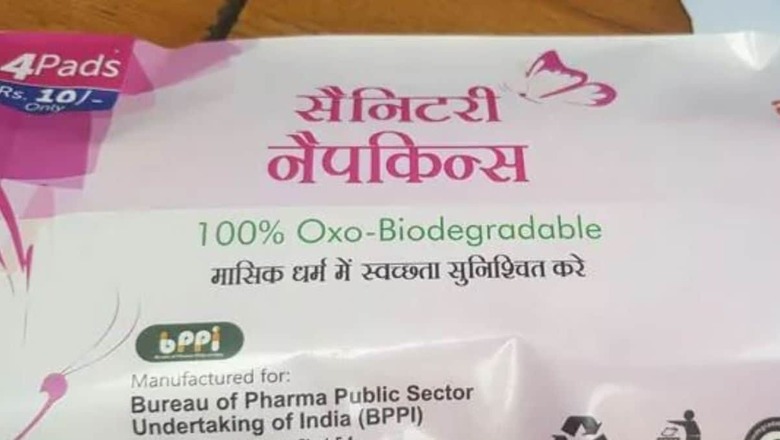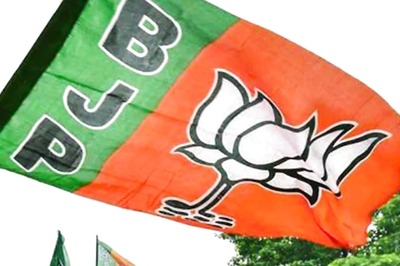
views
Uttar Pradesh tops the list in selling Re 1 Suvidha sanitary napkins under Prime Minister Narendra Modi’s affordable medicine scheme, Pradhan Mantri Bhartiya Jan Aushadhi Pariyojana (PMBJP), government data shows.
Based on sales data obtained by News18, Suvidha sales in Uttar Pradesh have reached approximately Rs 7 crore from June 2018 to September 30, 2023. Gujarat is the second-largest market, with sales of Rs 6.36 crore, followed by Karnataka (5.57 cr), Kerala (4.72 cr), and Jharkhand (3.19 cr).
Although the sales figures remain modest due to the product’s low price of only Re 1 per napkin — for which a standard pack of five or 10 is sold for Rs 5 and Rs 10 — the product’s demand is gaining momentum beyond metropolitan areas, aligning with the intended purpose of its launch.
The top five states have garnered these sales via 1,500 outlets in Uttar Pradesh, 613 outlets in Gujarat, 1,000 outlets each in Kerala and Karnataka and just 92 outlets in Jharkhand. Of the 10,000 Jan Aushadhi Kendras across India, around half of these outlets are established at block levels, tier 3 cities or tehsils.
“More than 5,000 kendras (outlets) are at the block level and their presence in these smaller cities facilitates women to easily access the Re 1 sanitary pad, improving their menstrual hygiene,” Ravi Dadhich, chief executive officer, Pharmaceuticals and Medical Devices Bureau of India (PMBI) — the government arm that executes the scheme — told News18.com.
The scheme was launched on March 8, 2018, as a special gift for all women on the occasion of International Women’s Day.
Launched by then Union minister Ananth Kumar, the product was pitched as “unique” and one that would ensure affordability, hygiene as well as ease of use and disposal.
The objective behind the launch was to ensure health security for those women in India who still use unhygienic aids during periods due to non-affordability of some popular brands of sanitary napkins.
Using unhygienic products such as cloth instead of napkins can cause fungal infections, reproductive tract infection, urinary tract infection, cervical cancer, and also make women vulnerable to infertility.
“As promised by honourable PM Narendra Modi, for providing these napkins at Re 1, we get financial support from the government. We have been successful in large-scale supplies to all parts of the country,” he said, adding that “internally, we are pushing ourselves to achieve the target of Rs 2 crore sales every month (of Suvidha napkins) in coming months”.
The plan appears attainable, given the government’s intention to expand the number of outlets from 10,000 to 25,000 under the PMBJP scheme, over the next two to three years.
12-Times Growth in 5 Years
The government is promoting the use of sanitary pads by creating awareness through cinema advertisements, bus brandings, state transport bus stands, audio advertisements, digital screen advertisements at railway stations and through social media platforms like Facebook, Twitter and by organising workshops.
In the first year, sales were under Rs 1 crore but they went up to Rs 2.72 crore in 2019-20. The trend continued, reaching Rs 8.75 crore in 2020-21, Rs 11.28 crore in 2021-22, and Rs 12.73 crore in the last fiscal year.
Up to September 30 this year, over 8.80 crore napkins have been sold through the scheme.
“These products have large volume and less weight and hence entail more transport costs and storage costs. That was a challenge which we overcame by directly taking supplies from manufacturers at the Kendras. This reduced our transport costs and ensured the availability of stock,” Dadhich said.
The product was launched to ensure ‘Swachhta, Swasthya and Suvidha’ for the underprivileged women of India, according to the press release issued by the Union government. “This step has been taken by the Union Department of Pharmaceuticals to ensure the achievement of Prime Minister Shri Narendra Modi’s vision of Affordable and Quality Healthcare for All,” the press release issued by PIB in 2020 said.




















Comments
0 comment